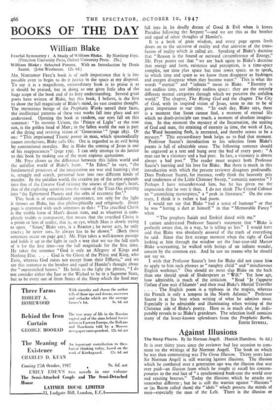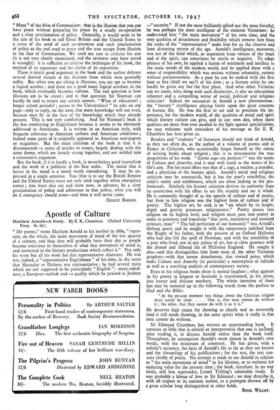Against Illusions
The Steep Places. By Sir Norman Angell. (Hamish Hamilton. 8s. 6d.)
IT is over thirty years since the reviewer had last occasion to com- ment on the writings of Sir Norman Angell. The book on which he was then commenting was The Great Illusion. Thirty years later Sir Norman Angell is still warring hgainst illusions. The illusion which he combated over a generation ago was the illusion that war ever paid—an illusion from which he sought to recall his contem- poraries to the real fact of "a synchronised bank-rate the world over and reacting bourses." Today the illusions which he attacks are somewhat different ; but he is still the warrior against " illusions " or (as Bacon called them) the ' idols" which possess the minds of men—especially the man of the Left. There is the illusion or "Maya " of the bliss of Communism : that is.the illusion that you can have peace without preparing for peace by a steady co-operation and a clear proclamation of policy. Generally, it would seem to be the aim of his book to call Great Britain and the United States to a sense of the need of such co-operation and such proclamation of policy as the real road to peace and the true escape from illusion in the face of Communism. We need not stay to criticise his aim (it is not very clearly enunciated, and the reviewer may have stated it wrongly): it is sufficient to criticise the technique of his book, the method of its argument and the clarity of its exposition.
There is much good argument in the book and the author delivers several shrewd thrusts at the illusions from which men generally suffer. But when you are tilting at illusions, you are apt to become a logical acrobat ; and there are a good many logical acrobats in the book, which eventually becomes tedious. The real question is how illusions are to be cured ; and to that question Sir Norman can hardly be said to return any certain answer. "What of education? ; longer school periods? ; access to the Universities? " he asks on one page—only to reply, on the next, that more knowledge will not avail, because men fly in the face of the knowledge which they already possess. This is not very comforting. And Sir Norman's book is the less comforting to Englishmen because it seems to be obviously addressed to Americans. It is written in an American style, with frequent reference to American authors and American conditions ; indeed some parts of it originally appeared in American newspapers or magazines. But the main criticism of the book is that it is disconnected—a series of articles or essays largely dealing with the same theme, which are loosely strung together, and not welded into a consecutive argument.
But the book, if it is hardly a book, is nevertheless good journalism and the work of a publicist of the first order. The moral that it leaves in the mind is a moral worth considering. It may be ex- pressed in a single sentence. You (that is to say the British Empire and the United States) must not only stick together when emergency comes ; you must. also say and show now, in advance, by a clear proclamation of policy and adherence to that policy, what you will do if emergency should come—and then it will never come.
ERNEST BARKER.



































 Previous page
Previous page